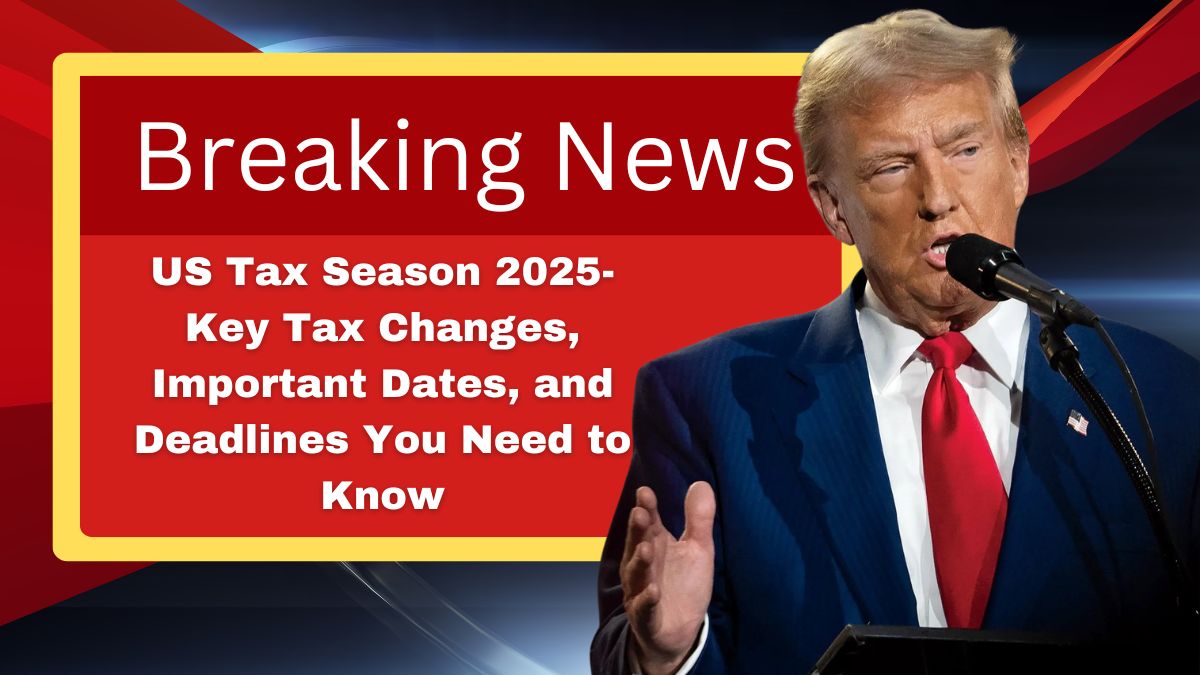Finance
US Tax Season 2025- Key Tax Changes, Important Dates, and Deadlines You Need to Know

The 2025 US Tax Session brings significant changes and updates designed to help citizens improve their tax outcomes. These revisions span multiple areas, from deductions and retirement plans to tax credits, offering taxpayers greater savings opportunities.
Understanding these changes is crucial for effective tax planning, ensuring that returns are filed correctly and that citizens can maximize their eligible benefits.
Overview of the 2025 US Tax Session
The US Tax Session 2025 is essential for every taxpayer in the United States, as it dictates the tax filing process. This session benefits a wide range of citizens, including those from low-income backgrounds, who can utilize it to access critical financial assistance provided by government programs.
The changes in the tax system aim to make it easier for individuals to manage their financial responsibilities and mitigate the effects of inflation.
The 2025 tax year will empower citizens to make more informed decisions, helping them manage taxes more effectively and claim available financial support.
Key Information for US Tax Session 2025
| Name of Department | Internal Revenue Service (IRS) |
|---|---|
| Program Name | US Tax Session 2025 |
| Country | USA |
| Tax Filing Deadline | April 15, 2025 (unless extended) |
| Benefits | Tax deductions, credits, retirement savings |
| Category | Government Aid |
| Official Website | IRS Official Website |
Major Changes in the 2025 US Tax Session
Increased Standard Deductions for 2025
One of the most impactful changes in the 2025 US Tax Session is the increase in standard deductions. This adjustment will reduce taxable income, thereby lowering the overall tax burden for individuals.
Taxpayers who do not itemize their deductions will benefit from keeping more of their earnings, with less being subject to taxation.
The new deduction amounts for 2025 are as follows:
- Single Filers: $15,000
- Married Couples Filing Jointly: $30,000
- Heads of Households: $22,500
These higher deductions allow individuals to reduce their taxable income, offering substantial relief.
Changes to Tax Brackets
In response to inflation, the IRS has modified the tax brackets for 2025. The new income thresholds mean that many taxpayers will fall into lower tax brackets, thus reducing their overall tax liability. The top tax rate of 37% now applies to individuals earning over $626,350.
For married couples, this top rate applies to those with earnings exceeding $751,600, an increase from the previous threshold of $739,000 in 2024.
Enhanced Earned Income Tax Credit (EITC)
The Earned Income Tax Credit (EITC) is designed to help working families with moderate and low incomes. For 2025, the EITC will be increased for taxpayers with three or more qualifying children, allowing them to claim up to $8,046.
This adjustment aims to help families keep pace with rising costs and inflation, providing additional financial relief. Families can claim this credit through a streamlined process to ensure they benefit from this assistance.
Increased Retirement Contribution Limits
In 2025, the IRS has raised the contribution limits for retirement accounts. This change allows taxpayers to contribute more to their retirement funds, helping them to maximize savings for the future.
The 401(k) contribution limit has been increased to $23,500 (up from $23,000 in 2024). Additionally, for individuals aged 60 to 63, the catch-up contribution limit is now $11,250, providing greater savings opportunities for older workers.
New Direct Filing Option
The IRS has introduced a new direct filing option that will be available in 25 states by 2025. This program allows taxpayers to file their returns directly with the IRS, bypassing the need for third-party tax software.
This initiative is designed to simplify the filing process and save time and money, especially for those with straightforward tax situations.
Strategies to Maximize Your Benefits for the 2025 Tax Year
1. Reevaluate Your Withholding
To avoid a surprise tax bill or a large refund, review your withholding allowances. Adjusting your withholding throughout the year can help ensure that the right amount of tax is withheld, reducing the likelihood of overpaying or underpaying.
2. Maximize Retirement Contributions
Take full advantage of the higher retirement contribution limits. Contributing more to your retirement accounts not only helps secure your financial future but also reduces your immediate tax liability by lowering your taxable income.
3. Review Available Credits
Make sure to assess your eligibility for the Earned Income Tax Credit (EITC) and other available credits. These can provide significant refunds depending on your financial situation and family size.
4. Standard vs. Itemized Deductions
Consider whether to take the standard deduction or itemize your deductions. If you have substantial deductible expenses, itemizing may provide greater tax savings.
The 2025 US Tax Session introduces several significant changes, providing opportunities for taxpayers to reduce their tax liabilities and increase their savings. Whether through increased standard deductions, modified tax brackets, or enhanced credits, there are many ways to benefit from these updates.
By understanding these changes and utilizing helpful strategies like reviewing your withholding and maximizing retirement contributions, you can make the most of the 2025 tax year.
FAQ
What is the deadline for filing taxes in 2025?
The tax filing deadline is April 15, 2025, unless an extension is requested.
What is the new standard deduction for single filers in 2025?
The standard deduction for single filers has increased to $15,000 for the 2025 tax year.
How has the Earned Income Tax Credit (EITC) changed in 2025?
The EITC has been enhanced to provide up to $8,046 for taxpayers with three or more qualifying children.
-

 Government Aid1 week ago
Government Aid1 week agoFebruary SSDI Payments: Only This Group Will Receive the First Checks of Next Month
-

 Finance2 days ago
Finance2 days agoRare Bicentennial Quarter Worth $15 Million
-

 Finance5 days ago
Finance5 days agoThe Lincoln Wheat Penny Worth $5 Million- Still Circulating Today
-

 Finance2 days ago
Finance2 days agoRare Coins: The 1964 D Lincoln Penny Errors You Should Know About
-

 Government Aid2 days ago
Government Aid2 days agoSocial Security Announces 2025 Check Increase, But a 23% Reduction is Expected Soon
-

 Finance2 days ago
Finance2 days ago1970-D Kennedy Half Dollar- A Rare Coin Worth Over $150,000 Still in Circulation!
-

 Government Aid5 days ago
Government Aid5 days agoThe Complete February SSDI Payment Schedule: Discover When You’ll Receive Your Disability Benefits
-

 Government Aid1 week ago
Government Aid1 week agoConfirmed: What You Need to Know to Collect $1,900 in Social Security by January 31















